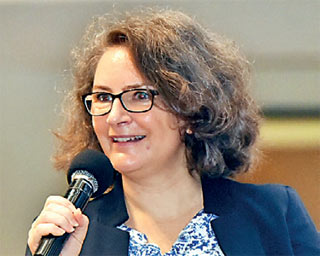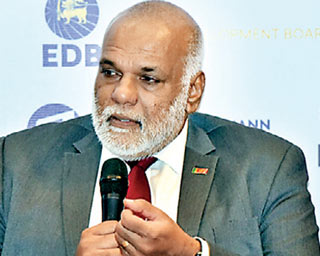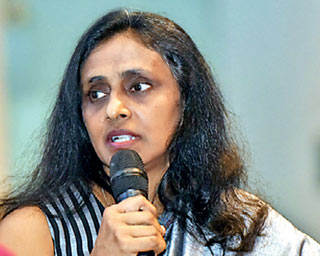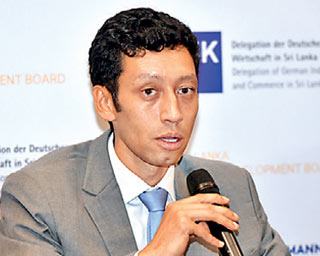Wednesday Feb 25, 2026
Wednesday Feb 25, 2026
Thursday, 24 November 2022 03:45 - - {{hitsCtrl.values.hits}}

AHK Sri Lanka Chief Delegate Marie Antonia Von Schonburg

EDB Chairman Suresh De Mel

EDB Export Services Director Indumini Kodikara

FNF Sri Lanka Head Wolfgang Heinze
By Darshana Abayasingha
Germany will impose its Act on Corporate Due Diligence Obligations in Supply Chains from January 2023, whereby all German companies are obliged to observe human rights and environmental obligations across their supply chains.
This will mandate suppliers from Sri Lanka and other countries exporting to Germany to adhere with requirements requested by importers. This could include contractual assurance, risk-based control mechanisms, audits and training measures.
Germany is a forerunner with the regulations and the European Union and other countries are expected to follow suit.
Speaking at an event in Colombo, Delegation of German Industry and Commerce in Sri Lanka Chief Delegate Marie Antonia von Schonberg said: “It is a global trend. The EU is working on a due diligence act of their own that will probably come into force in 2024, which is stronger than the German one.
“The German one focuses on labour laws on human rights whereas the EU one will also include environmental factors. It will be more complicated. The Act aside, even consumers themselves are asking for due diligence. We do have a head start, but we cannot be complacent.”
Yesterday, 26 officers of Sri Lanka’s Export Development Board (EDB) received certificates after training on aspects of the new Act. They will offer relevant support and assessments of Sri Lankan exporters. The program was conducted by Friedrich Naumann Foundation together with the Delegation of German Industry and Commerce in Sri Lanka.
In practice, Sri Lankan companies must be prepared to disclose relevant information on their operations on human rights and environmental expectations. The European Union is Sri Lanka’s second largest export market and Germany is the largest market for the island in the EU.
EDB Chairman Suresh De Mel, said the responsibility lies with the exporter, as there is only so much support the Government could give. “Exporters too must change their ways and comply. It’s the country’s reputation at stake and they can add more value to the exports and the country in this manner,” the Chairman said.
De Mel said Sri Lanka has adequate laws in place to support the expectations of Germany and the EU and the country already has “a head start”, but exporters need to comply. He encouraged producers in Sri Lankan to work closer with buyers so they have a better understanding of the expectations.
Speaking to the Daily FT, De Mel, an exporter himself, personally feels the new regulations are not going to be as imperative as GSP+, which is under negotiation, and expressed hope both parties will meet each other halfway in these discussions. He said there are many “class exporters” in Sri Lanka, and we should be exporting produce to large markets.
“But most of our produce is going to lower markets because of the trader mentality. There isn’t enough innovation and value addition.” The EDB is doing a lot of work, but there is no short cut, he added.